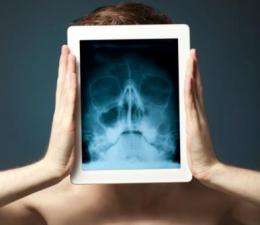Disadvantaged left behind in digital age

In a world where access to services is just a click away for many people, the well-off will prosper while the disadvantaged struggle to keep up as the digital divide widens and deepens.
That’s the message from Dr. Lareen Newman, a senior research fellow at Flinders University’s Southgate Institute for Health, Society and Equity.
An expert in the social determinants of health, Dr. Newman warns that as more health services go online in a bid to widen their reach, marginalised groups including the unemployed, elderly, disabled and educationally disadvantaged risk being left behind.
“A lot of services these days want people to download apps or log onto their websites to find information or contact them but they need to know who actually has and can use those technologies or people will miss out – and it’s usually the ones who are already disadvantaged,” Dr. Newman said.
“We assume that everyone’s got computers and iPhones these days but the data shows that’s not the case and there will always be people who have faster and better technologies, just as there will always be people who are better at dealing with things face-to-face,” she said.
“Digital communication can be useful, such as between visits to a health service, and it does have the potential to broaden peoples’ access but only if it’s done in a considered way.”
Dr. Newman has used her research on digital inequalities to help inform and influence policy, in particular the implementation of the State Government’s Strategic Plan which sets out a target to increase the number of South Australians using broadband so the percentage exceeds the national average.
She said that while the blueprint has its benefits, any digital plans for the future must consider minority groups and their capacity to access services.
“Even something as simple as sending a text can be a lot more complicated for people who don’t have the knowledge, social support or finances,” Dr. Newman said.
“A lot of mobile phone and Internet companies also require you to go on a plan and that’s just not a financially viable option for some people.”
In recent years Dr. Newman’s work has focused on the wider social influences on health across a range of areas, including the health and wellbeing impact of car manufacturer Mitsubishi’s decision to retrench more than 1000 workers from its Adelaide plant in 2004.
She is also currently working with the Modern Greek section of Flinders Language Department to investigate how older Greek migrants can be better supported to live in the community longer.
“Education, work, housing, income and social networks all shape a person’s wellbeing and influence their chances of living a happy, healthy life,” Dr. Newman said.
“A lot of health policies are focused on waiting lists and injecting more funds into hospitals but we should also be looking at the social determinants of health because services account for about 15 per cent of our health and the other 85 per cent is actually the conditions in which you live and work.”
Dr. Newman is a recipient of Flinders University’s Vice-Chancellor’s Awards for Early Career Researchers, an annual prize which aims to recognise individuals who have made an outstanding contribution to research at the University since finishing their PhD.
Provided by Flinders University


















